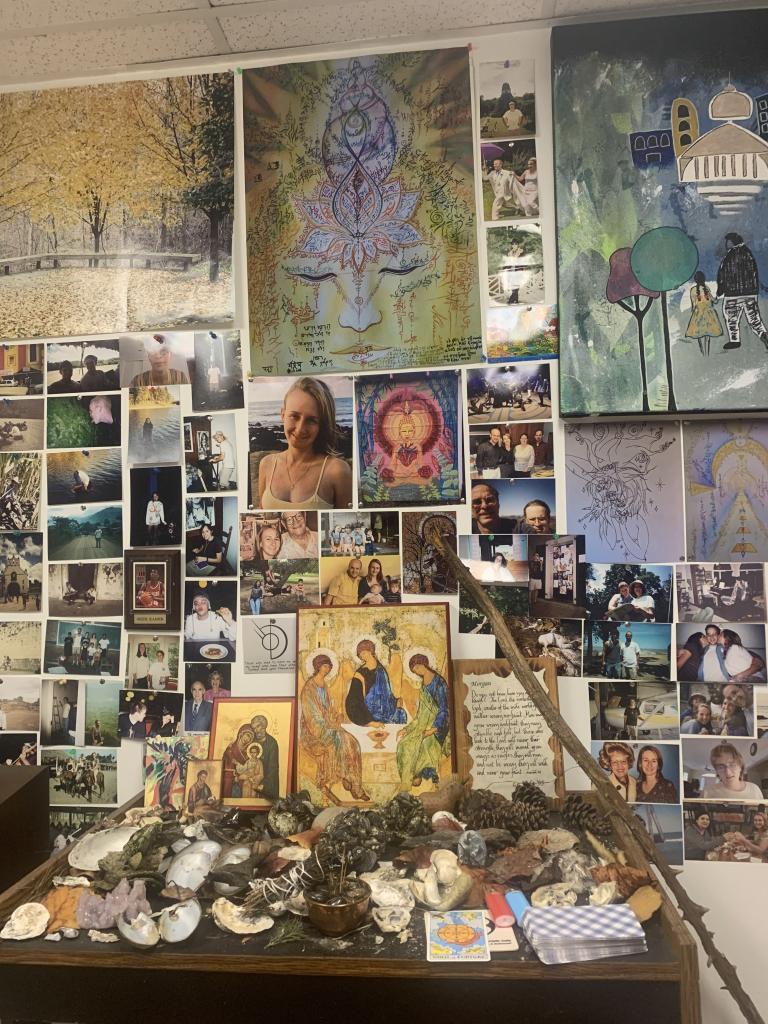When I was in my early twenties, I called myself a Christian pagan, a memory which later made me cringe with complete embarrassment in my neoorthodox thirties. In college, I had discovered Dionysus, the Greek god of wine, art, and madness, as well as Hekate, the pre-Olympian goddess of witchcraft. Somehow I stumbled upon a version of the mythology in which Dionysus is Hekate’s son/lover who is committed to overthrowing Zeus and the patriarchal Olympian pantheon which was likely my mind’s garbling together of new-age ecofeminist revisionism mixed with a little Nietzsche.
And so I secretly became Dionysus, the lover/son of the goddess, whose mission was to overthrow Christian patriarchy so that the divine mother could be recognized again after millennia of being burned at the stake. I wrote an epic rock song called “Mama” which encapsulated this purpose. I worshiped as a Christian and I basically believed in Christian theology, but I wrote love poems to Hekate, who was sometimes my lover and sometimes my mother.
I also learned that my name Morgan is the name of the ocean goddess of my Welsh ancestors, and every time I sat in front of the ocean, I felt like I was connecting with someone who was more intimate with me than any other human. Incidentally, Morgan is also the Welsh name of the Celtic Christian saint who become the notorious bogeyman heretic in the Western imperial church called Pelagius in Greek. Pelagius and Morgan mean “of the ocean” in their respective languages. I suppose I was destined to be a goddess heretic.
In some ways, I would argue that Christian pagan is simply a more honest label for the lineage of all people of European ancestry. The spirituality of our pre-Christian ancestors was mongrelized into Christianity (c.f. Yule “Christmas” trees, Easter bunnies, etc). Our alienation from our indigenous pre-Christian roots is a big part of our toxic collective anxiety as rootless “white” people who became a culture-less global culture at least partly because of Christianity’s claim to global universality which turned into the culturally-transcendant secular rationalism of the European Enlightenment. So realigning myself with the druidry of my Welsh ancestors is part of how I heal from the alienation of the whiteness of rootless global individualism.
It’s only been in the past year and a half of the pandemic that I’ve come back to the place of calling myself a Christian pagan again. But I mean something very specific. My theology remains and will always remain Christian. The cross and resurrection of Jesus Christ are my salvation through my participation in his anointing through crucifixion and incorporation into his resurrected body. I write praise songs using the psalms because that biblical book continues to be my primary source text for how to pray (even though some of my praise songs call God a mother).
At the same time, my spiritual practices have become “pagan,” not in the sense of having a specifically competing alternative cosmology to Christianity, but in the sense in which I hear millennial crystal-shops patrons calling themselves “pagan” — a sort of bastardized, muddy term for a spirituality of embodied practices involving the four elements of earth, water, wind, and fire instead of the mostly cerebral spirituality of Protestant Christianity which is almost entirely disembodied except for a once in a lifetime baptism and a weekly consumption of crackers and grape juice.
Perhaps my most important daily embodiment practice is to immerse myself in freezing lakewater every morning. Could I call it “remembering my baptism”? Sure. But I don’t have an angsty need for an orthodox Christian label that makes it valid. It simply refreshes my soul to freeze my ass off for a minute and reset my nervous system. I’m not necessarily thinking, “This is what I have to do to purify myself of sin,” but I do wonder if the reason the Jewish mikveh bath and then Christian baptism became sacraments is because cold water makes our bodies feel refreshed and purged of bad energy.
In addition to my daily cold water immersion, I also burn a lot of things in my basement office/recording studio/shrine. I like burning frankincense and myrrh in particular. I have covered the walls of my office temple in perhaps three hundred photographs of my ancestors, old friends, moments of natural beauty, literary influences, and gods and goddesses of various cultures who have influenced me. My icon walls keep me grounded when I want to jump out of my skin while counseling clients over Zoom. I also have a tarot deck that I draw from regularly, and it’s helped me on more than one occasion to prepare for shocking events and/or let go of painful, unresolvedly broken relationships.
If I needed to defend myself in a heresy trial, I would say that in all of these practices, I am simply availing myself of the sacraments in every created thing, in the broader Augustinian understanding of sacramenta rather than the seven Thomistic instituted sacraments of the church. I don’t think I am idolizing any one particular material object; rather I am worshiping God through all of them. And part of worshiping God right now for me means having a Rublev Trinity icon on my altar behind three clustered clam colonies stuck together underneath a black Jesus rescuing a white sheep, a youthful looking boddhisattva, and a light-code-encrypted icon of the divine mother, as well as my favorite photo of my wife on the beach.
Part of my purpose in using the label Christian pagan is subversive. I want to offend a certain kind of white Christian theobro, because I see the disembodied rationalism upon which so many white Christian theobros build their entire identity (like I did for many years) as a primary obstacle to the embodiment of God’s grace in the Western church. The idolatry of “orthodoxy” is paradoxically the haeresis of our age. What the disembodied rationalist calls heresy is any theology that isn’t perfectly correct, coherent, biblically robust, and logically impeccable. What the apostle Paul calls haeresis is being so stubbornly committed to your own correctness that you reduce your entire spiritual experience to a theological argument which destroys the possibility of creating a grace-centered community. The delicious irony of reading Paul’s letters is how much he raged against the exact type of pedantic, sanctimonious theologian who today uses Paul’s words as the foundation for his personal authority as a “bible teacher.”
The evangelical, postliberal, and neoorthodox versions of Protestant Christianity seem to profess that having a coherent cognitive theological framework is the foundation upon which a spiritual life needs to be built. The default assumption is that if we believe correctly (in our minds), then we will live correctly (in our bodies). There’s certainly some truth in that, but it tends to sabotage the sovereignty of God’s grace by making my correct appropriation of truth the effective source of my salvation even if part of my performative banter is to prattle incessantly about how everything is “all about Jesus.”
One of the most spiritually-attuned persons I ever met as a pastor was a woman who for whatever reason couldn’t accept the doctrine of Jesus’ bodily resurrection, which is why she felt that she couldn’t be a clergyperson, though she ended up starting an incredible spiritual formation ministry as a laywoman. My relationship with her was the beginning of the end of my neoorthodox phase in which I believed so hard that if I explained the gospel perfectly, then I was destined to plant a rapidly growing megachurch. I grew tired of being internally gaslit by the sense that if my congregation wasn’t rapidly growing, it was because I wasn’t explaining the gospel perfectly enough. Getting things right with God in your heart does not depend on getting them right in your head, which is why so many white theobros fighting noble battles over orthodoxy on Twitter are completely wasting God’s time and often undermining God’s work.
I think grace is actually quite simple: it’s knowing in your bones that you belong because you are safe and loved. While Jesus’ cross and resurrection do have the purpose of instilling this embodiment of grace into us as believers who need to know that our sin has not damned us, the objective reality of grace is not contingent upon any particular set of metaphors or stories. If grace is only allowed to happen in the context of correct theology, then the correct theology is what saves, not the grace itself. And the fear of grace giving itself the divine prerogative to exist outside the boundaries of orthodox theology is itself an obstacle to the full experience of God’s grace.
We live in a social media-saturated world in which so much of our reality is reduced to curated performative presentations of ourselves. Seeking belonging through likes on social media is a complete disaster. I know because I spent ten years being that complete disaster. What’s even more toxic is thinking that I have failed God unless I write the perfect depiction of the Christian gospel that viralizes throughout the world and saves the entirety of humanity. I thought that was what I was supposed to do. I think God made sure that I failed so I could actually get to know God.
The reason I know that I belong today is not contingent upon social media likes or even relationships with other humans. I know that I belong because God smiles at me in the sunbeams that reflect from the puddles in the creek next to my house where I walk barefoot every day on the way to my daily baptism in my lake. Being a Christian “pagan” simply means that I understand that synchronicity with the land is not different than my relationship with God. The woods and the lake next to my house are what give me the strange glossalalia that may or may not be an actual language. I have no proof that the mystical prophetic revelations I receive are from God, but I experience God talking to me intimately when I swim in freezing cold water and when I sit shivering on the bank afterwards. This intimacy is way deeper than anything I’ve ever experienced hearing a theobro in a pulpit expound upon his mind-blowing rationalistic epiphanies.
So I’m a Christian pagan or perhaps just an Augustinian/Pelagian mystic who believes that God’s grace is absolutely sovereign and that we are never actually in a state of total depravity because God is never not with us. Sure it’s a delusion to think that we are the source of any of our goodness. Sure it makes us toxic to turn our accomplishments into a basis for ego rather than a testimony of gratitude that God had the mercy to work even through me. But our bodies are not broken, corrupt, or terrible. They are traumatized by thousands of generations of ancestral pain and guilt. And they need daily embodied sacred practices in order to attain the grace that the Bible tells us about, which is so much richer than the theoretical cognitive concept the theobros seem to think it is. When you sit in the grace of God, not a damn thing matters beyond that. All my righteous deeds are like a toilet filled with bloody feces compared to the feeling my bones have when the grace of God reverberates through them.












